
Cheated on your diet? Feeling guilty? Here’s what to do!
You had a moment of weakness, caved in, and had a slice (or three) of cake. You cheated on your diet and feel terrible about it. What do you do now?
Today, we’re talking about what to do after you cheat and how to stop drowning in a sea of guilt.
But before we get to it:
I want to teach you about the psychology of weight loss. Over the next 7 days, I’ll show you why getting fit isn’t about cutting carbs, 30-day challenges, or grinding away on the elliptical. Instead, it's about changing your mindset, psychology, and habits (or what we call MPH) around food and exercise.
Sign up here for this FREE course and you'll learn that “what” you eat isn’t half as important as “why."
Want To Hit Your Health & Fitness Goals Faster?
Our FREE email course is here to save the day! We'll send you 7 days of tips and strategies that are better than anything you've ever read.
Okay, let's do this!
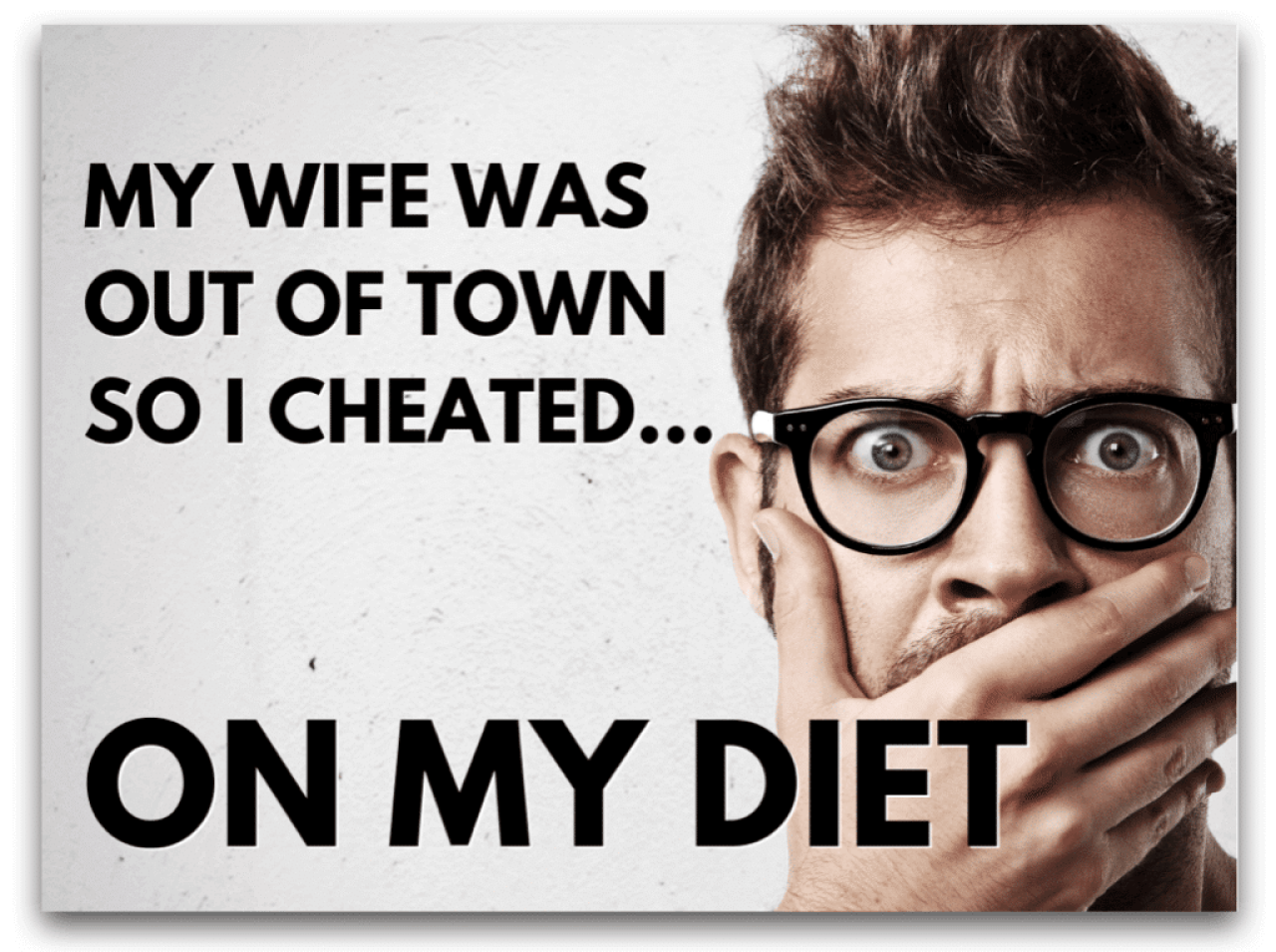
Oh, the guilt of cheating on your diet.
Here are the facts. You blew your diet and now you feel terrible.
Who knows what that's like?
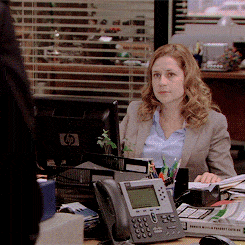
There’s a sting of disappointment, you feel weak for giving in, and you're thinking this whole “getting fit” thing is a huge waste of time.
Do you know how I know that?
Because for over a decade, I’ve coached thousands of clients and can tell you that guilt is a real problem. So if you feel like you’re all alone out there, don't. At some point, we'll all deal with a bout of guilt.
Listen. I know what it's like. Guilt is a terrible, terrible feeling. But we can't change what happened. That's over and done with. So instead of dwelling on it, let's focus on what to do next. And we'll get to that in a minute, but first, humor me while I go on a guilt-rant.
Guilt, huh, what is it good for? Absolutely nothing…
Oh, come on, you know the song! It’s okay, just sing the chorus a few times. I’ll wait.)
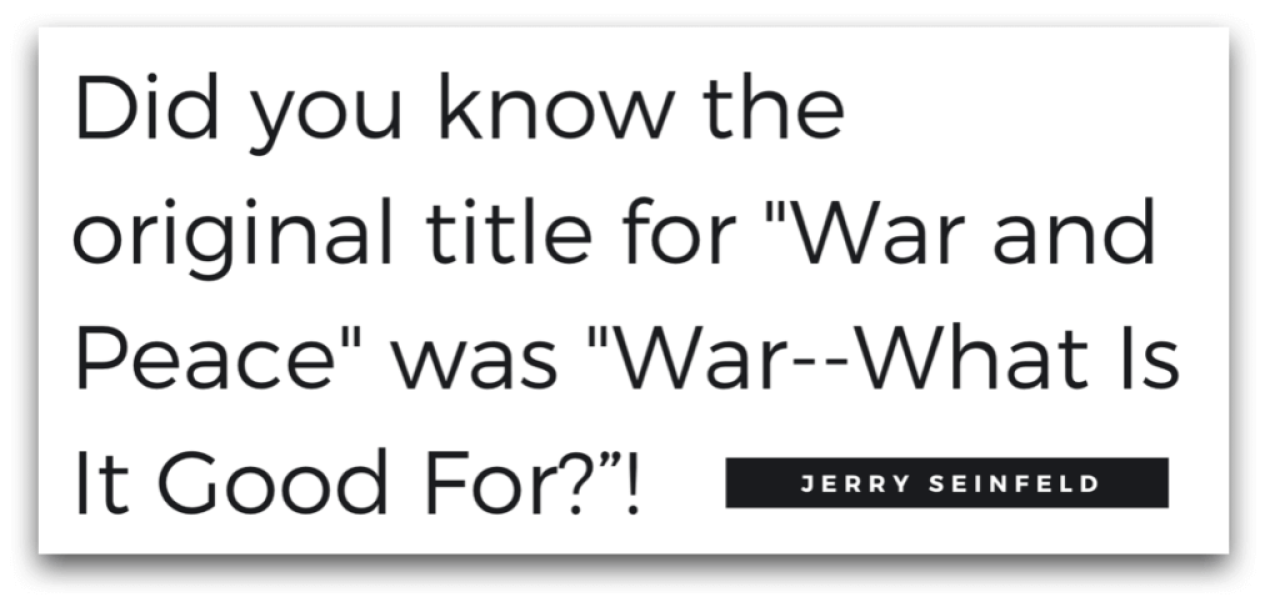
Okay, that was a slight tangent. But who doesn't love catchy songs and Seinfeld quotes?
So here’s my beef with guilt. Does it even have a purpose? Why is there an emotion that causes so much pain and inaction? It seems like biology really screwed up on this one.
Here's what I mean.
Let's look at two common guilt-inducing scenarios:
1.) You tell your mother you’ll call this weekend, but forget (either intentionally or unintentionally).
Now it's Monday and you feel so guilty you didn’t pick up the phone that you don’t call today either. Two weeks go by and you still haven’t called. Not even a “Hey, Mom. How’s it going?” text. What happens next? You feel even more guilt!
My question: If guilt is the reason you didn't call AND the reason her feelings got hurt in the process, then what good is it?
Here's another example…
2.) In December you said, “Starting January, it’s the gym for me! Every day, it's sixty heart-pumping minutes on the treadmill.”
But then… you miss a day.
Guilt consumes you, and it’s all downhill from there. And by the time March rolls around, you feel so bad about taking a three-month guilt trip you think, "Might as well wait 'till Summer’s over before starting over."
My question: You know you feel great after working out. But if guilt is so strong that it will literally drive your car out of the gym parking lot then why don’t we get rid of it?

And then there's the BIG question...Does guilt have a purpose other than making you feel like crap?
Guilt has a purpose. It’s just not what you think.
I once thought of guilt as an anchor dragging us from the things we want, like being fit and healthy.
Here’s how I saw the math of it all…
Guilt + Fitness Goals = Camping out on the couch
Inaction (you know, the whole couch thing) = Dissatisfaction
Dissatisfaction = Pain
So wouldn’t we all be better, healthier, and happier people if we just ditched guilt?
But maybe the question we should be asking is, Is that even the right way to think about guilt?
(Spoiler alert: No. In fact, that’s far from the truth.)
1.) Guilt isn’t an anchor, it’s an advantage.
Did you know guilt makes you a better leader? Research from the Harvard Business Review shows us:
“People who are prone to guilt tend to work harder and perform better than people who are not guilt-prone, and are perceived to be more capable leaders.”
2.) Guilt makes you a better friend, lover, and employee.
From The Telegraph:
“Existing research on guilt suggests that people who expect to feel guilty tend to be more sympathetic, to put themselves into other people's shoes, to think about the consequences of their behaviour before acting, and to treasure their morals.
As a result they are less prone to lie, cheat or behave immorally when they conduct a business deal or spot an opportunity to make money, studies suggest.”
So guilt isn't only there to make you feel terrible, it makes you a better leader, employee, spouse, and friend.
And that's great, but what about when we’re trying to stick to a diet or get fit? Is guilt an advantage there too?
I’m so glad you asked!
3.) Guilt can actually help you stick to your diet.
You know guilt makes you feel horrible, and who wants to walk around carrying that weight? No one. But it's the discomfort of guilt that makes it such an advantage. In fact, it's amazing the lengths we’ll go to avoid that pain.
Imagine you dive fork-first into a pan of brownies. It sounded like a good idea in the moment, but do you remember how you felt the last time that happened?
Yeah, I know you do because I do too. It was really, really amazing—for about five minutes. Then that feeling vanished.
And when it was all said and done you felt absolutely terrible. And no sooner than when you loosen your belt or put your sweatpants on, there's guilt waiting for you.

I can recall what it's like in vivid detail. Can't you?
And when we remember how that feels, the anticipation of discomfort taps us on the shoulder and says, "Hey, how about you put the fork down and slowly back away."
Ph.D.’s Michael Ent and Roy Baumeister in their work on The Functions of Guilt say it like this:
“Anticipating guilt associated with self-regulatory failure can motivate people to self-regulate and thereby avoid guilty feelings.”
The feeling of guilt actually decreases your chances of falling into the same trap again. So the next time you feel guilty about cheating on your diet, remember what you're feeling, really let it sink in. Because your desire to avoid this feeling is a powerful motivator.
How to deal with cheating on your diet AND the guilt that follows.
1.) You’re looking at cheating and guilt all wrong.
Anytime someone says, “I just cheated on my diet and feel terrible. What do I do?” I say you have two options, you can either:
Look at guilt as a show stopper, or
See it as an advantage.
I see it as the latter. Do you?
It's important to know that what you do after you cheat is directly tied to how you think about it?
Do you believe you failed at yet another diet? Or,
Did you learn a valuable lesson that will make sticking to your diet much, much easier?
Let's say you signed up to run a 5K. And on your first day of training, you lace up your shoes, step outside, and hit play on “Let’s Get It Started,” by The Black Eyed Peas. (Good song, right?)
Your goal is to run 3.2 miles, but after mile one, you’re huffing…your thighs are burning...you’ve run out of steam.
How do think about what just happened?
Did you fail at training for a 5K? Or,
Did you experience a little necessary discomfort that will help you run longer and faster?
See. If you look at it as a failure, you'll throw your hands up and quit. BUT, if you see it as simply part of the process, you’re going to keep at it.
The same is true after you've cheated on your diet.
Here's my question to you:
Will you see an "off" meal as a three-month sentence of no action, wallowing in self-pity, and beating yourself up?
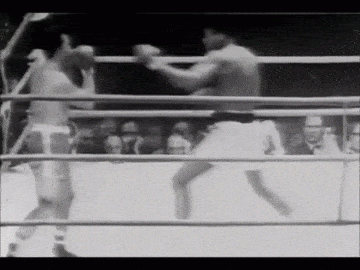
OR,
Will you see it as a helpful lesson you won’t soon forget, the experience that makes the next choice even easier, and a unique advantage you have that will help you get exactly what you want?
2.) Let’s all agree to stop using the word “cheating”.
You hear it all the time.
…I’ve got a “cheat” day coming up.
…Don't eat that, it's “cheating”!
I hate the word "cheating" because it implies that you’re acting dishonestly. Like you were supposed to do something the “right” way, but didn’t.
So if we’re talking about stealing the answers to an algebra test, “cheating” is probably the right word. But, when we’re talking about eating cookies, let's just say you "had an indulgence”.
What’s the difference?
“Cheating” implies you did something wrong. But you know that's not true. What rule did you break? Is there some universal healthy eating law? Listen. If no one else will tell you, I will. You did nothing wrong.
“Having an indulgence” simply means you had a treat. It might not be on the Top 10 List Of Fat Burning Foods, but you ate it. It happened. It's over.
Having an indulgence has absolutely no bearing on IF you stick to your diet or IF you failed.
Speaking of indulgences, that falls right into…
3.) Learn to use the two-week test.
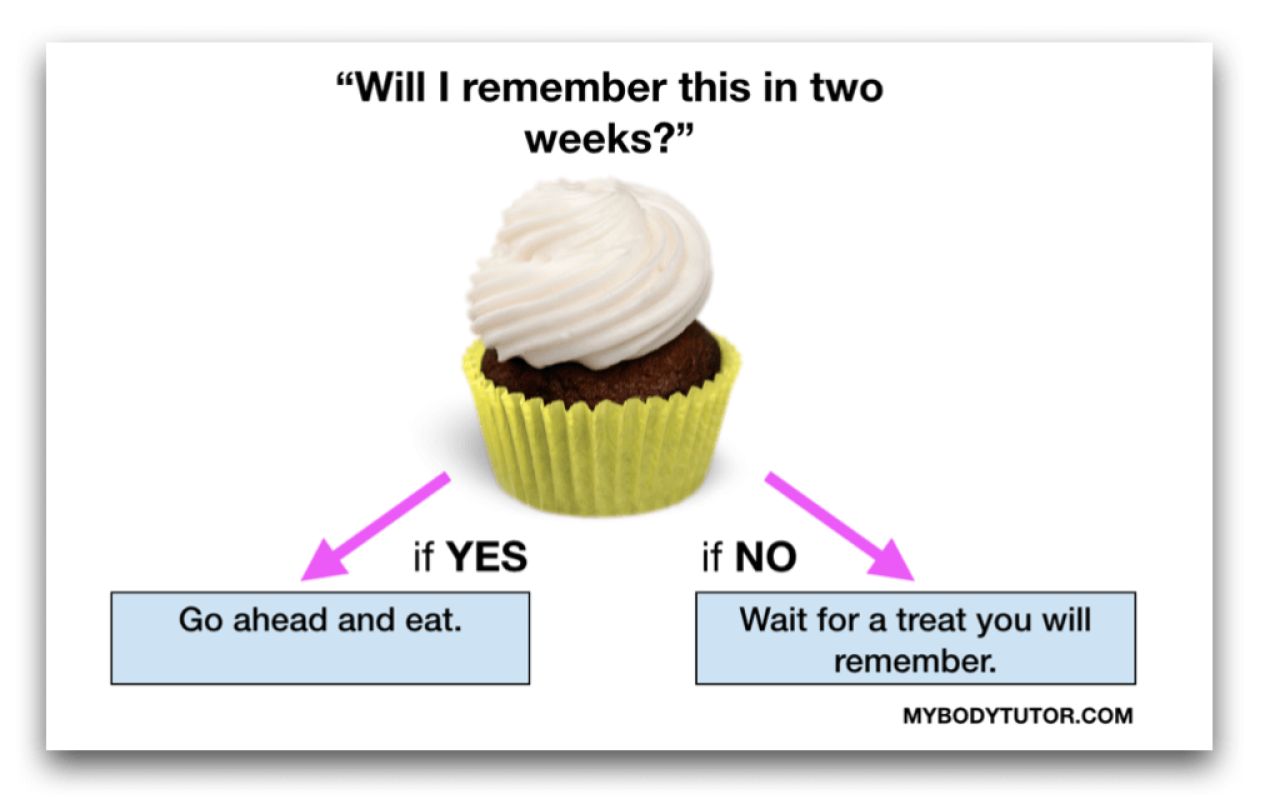
When you have an indulgence, it should be special to you.
Think about it this way, will you remember that bag of chips two weeks from now? If you will, I want to know what you're eating so I can try those for myself! But the chances are you probably won’t remember them tomorrow.
If you want to indulge, do it! I encourage you to. The goal is to be fit and happy not fit and miserable.
So here’s what you’re shooting for: you want your treat to be remarkable.
How do you know? It’s simple. Ask, “Will I remember this in two weeks?”
If the answer is yes, go for it.
If not, hold off for something that will.
BONUS: How to change your mindset around dieting and guilt.
If there's anything I know, it's easy to read great advice, have something steal your attention (squirrel!!), and completely forget to take the steps to master your mindset around food and guilt.
But guess who won't let you forget? MyBodyTutor. That's what we do! In fact, it's what we live for! We're there helping you change your mindset, psychology, and habits around food. And we do that each and every day with accountability and support. There is nothing more exciting for us than to see you crushing your goals.
Looking for inspiration? Then, you HAVE to read Janice's success story!
Here is one of my favorite parts...
"I realized something very important was missing for me. I realized I needed someone to team up with, not a workout partner, not a trainer – I needed someone to not just believe in me and encourage my success, but to truly CARE if I succeeded. Care if I made it to the gym. Care if I stayed on track with my diet. Care – on a daily basis."